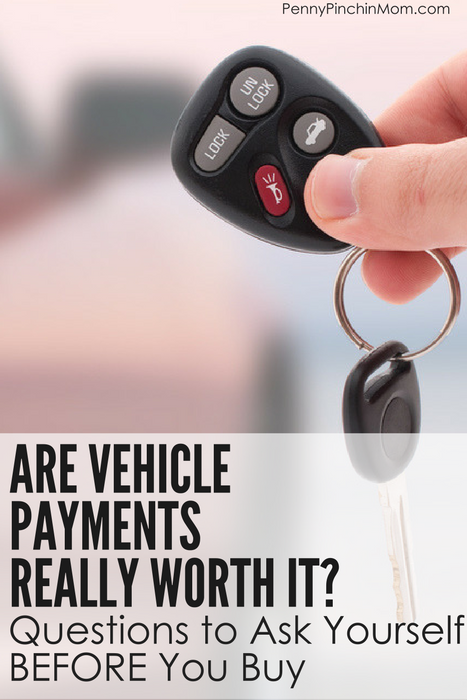Are car payments worth it? Find out what my husband had to say on this topic.
After several years of my husband listening to me talk about posts, deals, and all things money saving, I offered my husband the opportunity to do a post himself! We have been talking a lot about our vehicle and if we should get rid of it or continue to drive it. We had to ask ourselves are car payments worth it?
That lead to the idea of him sharing his thoughts and facts regarding the true costs of auto loan payments. Maybe you’ll re-consider an auto purchase with a loan the next time you are in the market or have the “itch” to by that new ride.
Many of us have gotten that itch to have that first brand new car (or truck as in my case). Yes I’m a truck guy, love my trucks. I’ve had four trucks. Quite frankly I’ve borrowed money to pay for three of these trucks. One I bought for $2,500 cash, and then spent a lot repairing it, got tired of repairs and thought I needed a new one that didn’t need repairs.
It was November 1996. On a whim, I saw a new extended cab on sale in the newspaper. So I drove my little Toyota to a GM dealership and asked how much can I get for a trade-in. He told me $1,600. My heart sank. I had spent over $2,500 on that Toyota in repairs alone in one year, plus what I paid for it. And they tell me they’ll give me $1,600 like they are doing me a favor. Seriously?
With some reluctance and excitement, I traded my Toy for a brand new GMC extended cab. It cost around $17,000. I went to the bank and borrowed the money. Yes, I remember my 60-month payment being about $315/month. Looking back, I paid about $3,500 in interest over the term of the loan. That’s a lot of dough. And you wonder why banker owners are wealthy!?!
The vast majority of American’s finance their auto purchases and we love our automobiles. I am not sure whether we American’s love car payments more than our cars? So what if I had driven my Toyota a little longer and saved some money to buy another truck for cash?
Maybe I could not have purchased a brand new one, but with cash I could have bought a used extended cab for $9,000. What if I had invested the $3,500 in interest I paid in a growth and income mutual fund over five years at a 9% average return? I would have made $1,623.63 in interest plus got my original $3,500 investment back.
Let’s not forget to that almost all cars and trucks go down in value over time, they need repairs, they are not an investment. Automobiles are a money pit! But yet almost all of us need one to function in modern society, there is no getting around that.
Automobile loans are one of the largest impediments to financial freedom in our American culture. We are told by the car industry that “we’ll get you financed – no money down”. Here are some questions you should ask yourself before you buy:
Can I repair it for less than the cost of a new vehicle?
If you can, always repair what you own, as most of the time it’s much cheaper to fix an auto than to take on the costs of a loan. If you have some mechanical skills and tools, fix your car on your own (within reason, of course).
Is this vehicle a want or a need?
Sure, we’d all love to get a new vehicle, but do you really need one? Is there really any reason you must get rid of the one you are currently driving.
Can I cover the cost with cash?
It is always better to pay cash for a car or truck than it is to take out a loan. It may mean you have to buy one that is a bit older and costs less money. However, not having a loan payment is usually the better option.
Remember, that most vehicles today can be driven hundreds of thousands of miles before needing repairs.
Don’t be lulled into thinking you need a new vehicle after your current one turns over 100,000 miles. I drove my 1999 model with more than 200,000 miles on it for years (just traded it off around 15 months ago – and paid cash for a new one). Sure, it was full of rust, but it was paid for and we saved a lot of money on our personal property taxes due to it’s age.
Also See: How to Save Up for a Car Without Breaking the Bank
Have I thought about this purchase?
When in the market for another vehicle, don’t get impulsive. There are plenty of used vehicles on the market, there is no shortage.
Take your time in shopping. A vehicle is the second largest purchase most people make in their lifetime, next to a home purchase.
